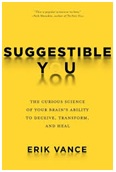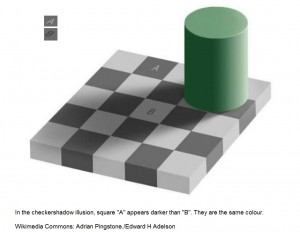Reference: Vance, Eric Suggestible You; The curious science of your brain’s ability to deceive, transform, and heal. National Geographic Partners; 2016
“The brain is an expectation-prediction machine” p.152

Our brain has evolved for survival and one of its greatest tactics is to have expectations. From learned expectations it can predict the complex world we live in, in order to survive.
Expectations are learned from every event experienced in life since infancy. The brain becomes “wired” with each experience further strengthening our expectations of specific events that occur in our lives. If A occurs then B happens and if C occurs, then D happens, etc. If we turn on a faucet, we expect water to come out.
We learn to walk by expecting that when we place one foot in front of the other, we will move forward…we expect that gravity will always hold us down …we expect the floor we walk on will not collapse …we expect that when we swing our leg, our tibialis anterior will fire and we will dorsiflex and not fall …we expect that if we fall we can get back up again …hence based on these learned expectations we eventually master the art of walking to the point where millions of these subconscious expectations and predictions allow us to walk with little thought or effort.
Expectation is the way the brain processes the world. It determines our response to a foul odour, a beautiful piece of music, a view of a sunset, a bitter taste and a sensual touch.
In this optical illusion you expect that A & B are different shades of grey; but they are the same!

The simple explanation is that your brain, based on past experiences has the expectation that a checkered board is set up as alternative black & white, hence in that sequence, box B must be lighter than box A …you EXPECT it and PREDICT it, so it must be true!
In addition, there is a green cylinder that casts a shadow over box B and not over box A, and since we EXPECT and PREDICT that shadows make things darker, then box B must in essence be even lighter than what we actually see …you EXPECT it and PREDICT it, so it must be true!
“Simply put, your brain doesn’t want to be wrong – and in order for expectation to match reality, it’s willing to bend a few rules or even cheat outright …your brain’s expectations are more powerful than we ever imagined. When those expectation clash with reality, more often than not, it’s your stubborn brain that wins.” pp.16-17
Of course the vast majority of our expectations and predictions are extremely beneficial or else every activity we would attempt from the moment we woke up would be a new experience; we would have to learn to walk, use the toilet, brush our teeth, use the stairs, eat, etc. all from scratch every morning!
The same expectation-prediction phenomenon that is at the core of our survival is in essence responsible for the nocebo and the placebo effects.
If what we expect is negative, the brain will rightfully predict the expectation and make things feel or look worse than they actually are (make box A even darker). If what we expect is positive, the brain will also naturally expect and make things feel and look better than they actually are (make box B even lighter) …read on!

